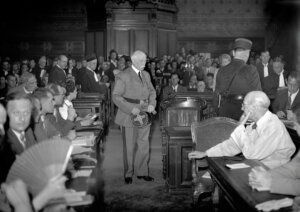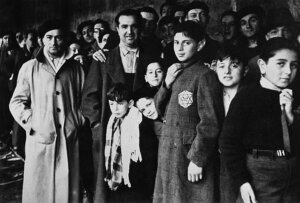Eventually, the French turned against their government — when will Americans turn against Trump?
French opposition to the roundups of its Jewish citizens during WWII offer reasons for hope today

Donald Trump observes the installation of a flag pole. Photo by Getty Images
As we struggle to find our footing amid the Trump administration’s relentless assault on the rule of law and rights of citizens and non-citizens, an event that happened 80 years ago suggests reasons for hope rather than despair.
June 23, 1945, marked the beginning of le procés Pétain, the postwar trial of Marshal Philippe Pétain. Venerated as the “hero of Verdun,” the octogenarian Pétain was given full powers in 1940 to preside over the French State. This regime, better known as Vichy, held power during the four long years of French collaboration with Nazi Germany, the country that had defeated and, at first, occupied roughly the northern half of France. (In 1942, Germany extended its occupation to the southern half, until then under the control of Vichy.)

Tried and found guilty by the jury for the high crime of treason, Pétain was condemned to death, a sentence subsequently commuted to life imprisonment by the provisional government’s leader, Charles de Gaulle. Though mostly ignored during the trial, the most appalling of the crimes of collaboration with a genocidal regime was Vichy’s participation in the machinery of the Final Solution, which resulted in the deportation and death of more than 70,000 French and foreign Jews by 1944.
Between 1940 and 1942, however, antisemitic legislation was wholly the work of the Vichy regime, including Pétain who edited the phrasing of these laws and, in 1941, created the General Commissariat of Jewish Affairs (CGAJ), tasked with their application. This department was first managed by Xavier Vallat, a veteran antisemite and devout Catholic who ordered a census of all Jews living in the Unoccupied Zone, following the example of the Germans who had already done so in the Occupied Zone.
In the summer of 1942, the moving parts to the Final Solution quickened. Pressured by Theodor Dannecker, the SS officer overseeing the process, Pétain and his prime minister Pierre Laval ordered the gendarmerie to launch a nationwide series of rafles, or roundups. Tens of thousands of Jews, at first mostly foreign but increasingly French-born, were swept up and packed off to internment centers.
The most infamous roundup occurred in Paris in mid-July. French police bussed more than 13,000 men, women, and children to the Vel d’Hiv, an indoor cycling stadium, where they were kept for several days in abjectly inhumane conditions before being transferred to Drancy, the French point of departure to Auschwitz. Apart from 2,500 thousands survivors, this proved to be a one-way ticket for 60,000 others who were also trundled to Auschwitz.
Yet the roundups did not occur in a desert, but instead in cities and towns across France. And it is there, on city boulevards and town squares, that the meeting of France’s past and America’s present becomes so telling.

Take the case of the southern city of Nîmes, the subject of my book on the collaboration and resistance during the Occupation. With the assistance of the French government, I was given access to previously unread documents dating from the war years. In the dozens of boxes I rummaged through, there were sheafs of yellowing police reports, administrative orders, and most importantly, copies of hundreds upon hundreds of letters that were steamed open, transcribed, and filed away. These letters, which were then resealed and sent on their way, were a critical means for Vichy to check the pulse of public opinion.
The pulse of the locals shot up alarmingly in the wake of the rafles that occurred in Nîmes and nearby towns in August, shortly after those in the Occupied Zone. When police surrounded a foreign workers camp near Nîmes and carted away dozens of its residents, the director compared the action to a “kidnapping.” Though he confessed that he “hardly likes this race [Jews], a resident of the town of Aulas found the roundups “painful.” He found the “measures taken against [the Jews] are much too exaggerated. Excess in anything is a fault.”
This same sentiment — namely, that the rafles were cruel or excessive — was repeatedly expressed in the letters. One woman in Nîmes lamented that “heartbreaking family scenes are taking place, and there have even been suicides.”
“As unpleasant as the Jews may be,” she wrote, “one feels sorry for them all the same for being subjected to such treatment. It is really inhuman.”
“The Jews have all been shipped off to concentration camps,” a citizen of the town of Uzès exclaimed. “I wonder why we are not just baptized as Germans. We haven’t much reason to be proud of being French.” A leader of Vichy’s youth movement, Compagnons de France, found himself at the train station when the arrested Jews were being trundled off to the east. Overwhelmed by the sight, he cried out the word “Courage” and fled the station.
It is not an accident that, as police reported, public opinion began to turn against Vichy. As one police official in Nîmes warned more than a month after the roundups, locals were still deeply disturbed by the separation of parents from their children. These and similar actions “provoked an indignation that, far from calming down, seems to have been largely kept alive.” In a word, the confidence the French, in 1940, had overwhelmingly felt in Pétain, now began to fracture, marking the beginning of the end of the regime.
Here is where present events in our country rhyme, if not repeat, with past events in France. Last month, Stephen Miller, the architect of Trump’s immigration policy, berated ICE officials for their failure to rafler enough undocumented immigrants to meet his goal of one million deportations by year’s end. Since then, ICE agents have invaded factories, farms and stores to cart away the usual suspects who are guilty of seeking a better life for themselves and families.
The MAGA base seem no more disturbed by these actions than were the dyed in the wool antisemites in wartime France. Yet there are an increasing number of Republicans who, drawn to Trump’s promises to rid our country of the “animals,” “monsters,” “killers,” and “predators,” are now discovering that these people also find the time to harvest their crops, package their clothing, care for their aged and ill, and clean their hotel toilets. In fact, as in the case of Ming Li Hui, the Hong Kong native who has lived in a small Missouri town for 20 years, they also wait on their tables, attend their churches, and whose children play with their children.
Unlike Pétain, Trump is not under the thumb of true alien criminals like Theodor Danneker. But he is under the thumb of the language he has repeatedly used to justify the unjustifiable and to accomplish the unspeakable. It remains to be seen whether, as nearly a century ago in France, this will mark the beginning of the end of Trump’s repugnant reign of unchecked power.
















